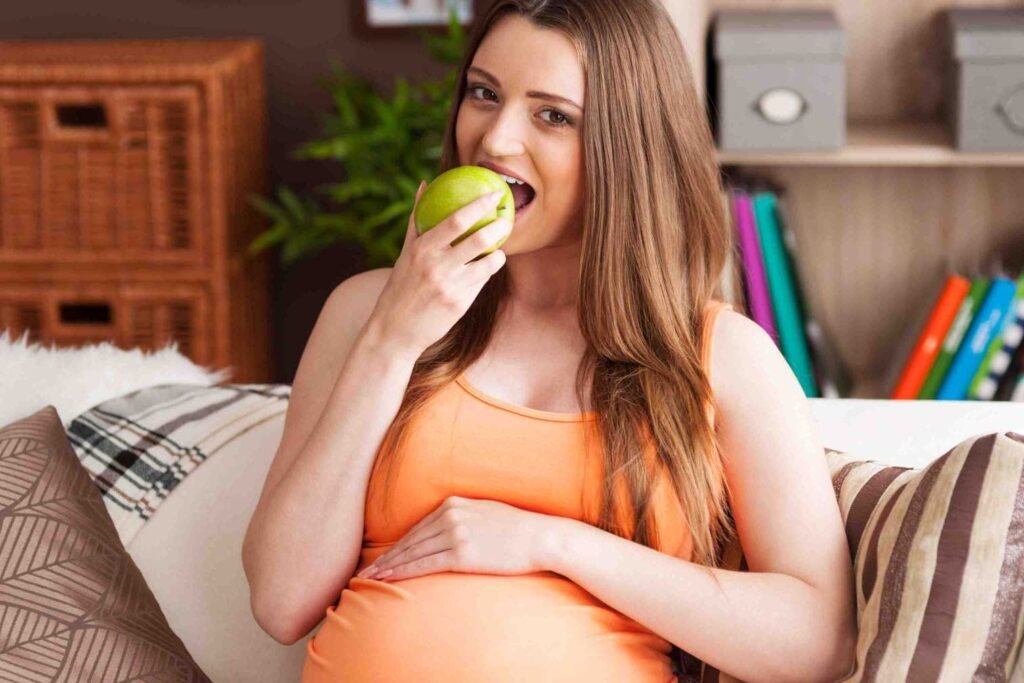A Comprehensive Guide on Foods to Avoid During Pregnancy
Pregnancy is a transformative period in a woman’s life, marked by rapid physical changes and the need for increased nutritional vigilance. The foods a pregnant woman consumes can significantly impact both her health and the development of her baby. While a balanced diet rich in essential nutrients is crucial, it is equally important to be aware of certain foods that should be avoided. These foods can pose risks ranging from mild discomfort to severe health complications for both mother and child. In this comprehensive guide, we will explore various foods that pregnant women should avoid, including both vegetarian and non-vegetarian options, to ensure a safe and healthy pregnancy.

Understanding the Importance of Diet During Pregnancy
Pregnancy is a pivotal time in a woman’s life, bringing about significant physical and emotional changes. The foods consumed during this period play a crucial role in ensuring the health and well-being of both the mother and the developing baby. A balanced and nutritious diet provides the essential nutrients required for fetal growth and maternal health, while also helping to manage pregnancy-related symptoms and reducing the risk of complications. Here, we delve deeper into the importance of diet during pregnancy, highlighting key aspects that emphasize why careful dietary choices are vital.
Nutrient Supply for Fetal Development
- Growth and Development: A fetus grows rapidly during pregnancy, requiring a continuous supply of nutrients to support cell division, tissue formation, and organ development.
- Brain Development: Nutrients such as omega-3 fatty acids, iron, and iodine are crucial for the development of the fetal brain and nervous system.
- Bone and Teeth Formation: Calcium and vitamin D are essential for the formation of strong bones and teeth in the developing baby.
Maternal Health and Well-being
- Energy Needs: Pregnancy increases a woman’s energy requirements. A nutritious diet helps meet these increased energy demands, ensuring the mother feels energetic and healthy.
- Weight Management: Eating a balanced diet helps in maintaining a healthy weight gain during pregnancy, which is important for reducing the risk of gestational diabetes and hypertension.
- Nutrient Stores: Pregnant women need to build up their nutrient stores to prepare for breastfeeding and postpartum recovery.
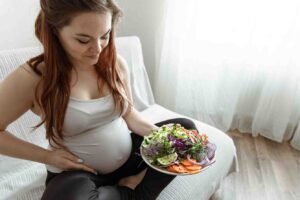
Managing Pregnancy Symptoms
- Morning Sickness: Certain foods and eating habits can help alleviate nausea and vomiting commonly experienced during the first trimester.
- Heartburn and Indigestion: A balanced diet with appropriate meal timing can help manage digestive issues that are common during pregnancy.
- Constipation: High-fiber foods and adequate hydration are crucial for preventing constipation, a common complaint during pregnancy.
Reducing the Risk of Complications
- Gestational Diabetes: A diet low in refined sugars and high in complex carbohydrates and fiber can help regulate blood sugar levels and reduce the risk of gestational diabetes.
- Pre-eclampsia: Consuming a diet rich in antioxidants, vitamins, and minerals can help lower the risk of developing pre-eclampsia, a condition characterized by high blood pressure and protein in the urine.
- Anemia: Iron-rich foods and those high in vitamin C (which enhances iron absorption) are important for preventing anemia, a condition that can cause fatigue and complications during delivery.
Supporting the Immune System
- Immune Boosting Foods: A diet rich in vitamins A, C, and E, as well as zinc and selenium, helps strengthen the immune system, which is especially important during pregnancy when the immune response is altered.
- Preventing Infections: Consuming foods that support gut health, such as probiotics and prebiotics, can help prevent infections that could potentially harm the mother and baby.
Long-term Health Benefits
- Reducing Chronic Disease Risk: A nutritious diet during pregnancy can reduce the risk of chronic diseases for both the mother and the baby later in life. For instance, proper nutrition can help prevent childhood obesity and diabetes.
- Setting Healthy Eating Habits: The dietary choices made during pregnancy can influence the child’s future eating habits and preferences, promoting a lifetime of healthy eating.
Emotional and Psychological Well-being
- Mood Regulation: Nutrients such as omega-3 fatty acids, B vitamins, and magnesium are important for maintaining mental health and can help reduce the risk of prenatal depression and anxiety.
- Stress Management: A balanced diet helps regulate hormones and can improve the mother’s ability to cope with stress during pregnancy.

What Foods to Avoid During Pregnancy?
To help navigate the dietary landscape during pregnancy, let’s delve into specific foods that should be avoided.
Raw and Undercooked Foods
Raw or undercooked meat and poultry can harbor harmful bacteria such as Salmonella and E. coli, which can cause severe food poisoning. Pregnant women are more susceptible to these infections due to their weakened immune systems. Symptoms can include nausea, vomiting, diarrhea, and abdominal pain, which can lead to dehydration and other complications.
Deli Meats
Deli meats, including ham, salami, and turkey, are often contaminated with Listeria, a bacteria that can cause listeriosis. Listeriosis is particularly dangerous during pregnancy, as it can lead to miscarriage, stillbirth, or severe illness in newborns. Heating deli meats until they are steaming hot can reduce the risk, but it’s generally safer to avoid them altogether.
Raw Eggs
Raw or partially cooked eggs can be contaminated with Salmonella. Foods that commonly contain raw eggs, such as homemade mayonnaise, salad dressings, and certain desserts (like mousse and tiramisu), should be avoided unless they are made with pasteurized eggs. Symptoms of Salmonella infection include fever, nausea, vomiting, and abdominal cramps.

Sushi and Raw Fish
Sushi and other dishes containing raw fish are popular but should be avoided during pregnancy due to the risk of parasites and bacteria. Additionally, some types of fish can contain high levels of mercury, which can harm the developing baby’s nervous system.
High-Mercury Fish
Mercury is a heavy metal that can have serious adverse effects on the developing nervous system of a fetus. Certain fish accumulate higher levels of mercury in their bodies, making them particularly risky for pregnant women.
Fish to Avoid
- Shark
- Swordfish
- King Mackerel
- Tilefish
- Bigeye Tuna
These fish are known to contain high levels of mercury and should be avoided. Instead, pregnant women can consume low-mercury fish such as salmon, trout, and sardines, which are also rich in omega-3 fatty acids beneficial for fetal brain development.
Unpasteurized Dairy Products
Soft Cheeses
Soft cheeses made from unpasteurized milk, such as Brie, Camembert, Roquefort, and feta, can be contaminated with Listeria. It’s safer to choose hard cheeses or those made from pasteurized milk, which are less likely to harbor harmful bacteria.
Raw Milk
Raw milk and products made from raw milk can contain harmful bacteria like Listeria, E. coli, and Salmonella. These bacteria can cause serious infections, so it’s best to consume only pasteurized dairy products during pregnancy.
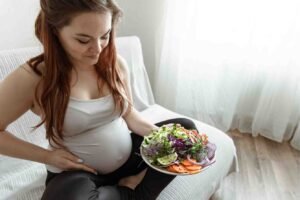
Caffeine
While moderate caffeine consumption is generally considered safe during pregnancy, excessive intake can lead to complications such as low birth weight and preterm birth. Caffeine is a stimulant that can cross the placenta and affect the baby’s heart rate and metabolism.
Sources of Caffeine
- Coffee
- Tea
- Energy Drinks
- Certain Sodas
- Chocolate
Pregnant women are advised to limit their caffeine intake to 200 milligrams per day, equivalent to about one 12-ounce cup of coffee.
Alcohol
Alcohol consumption during pregnancy is strongly discouraged due to the risk of fetal alcohol spectrum disorders (FASDs). These disorders can cause a range of physical, behavioral, and cognitive impairments that can last a lifetime. No amount of alcohol has been proven safe during pregnancy, so it is best to abstain completely.
Certain Fruits and Vegetables
While fruits and vegetables are generally healthy, certain types should be consumed with caution during pregnancy.
Papaya
Papaya, particularly unripe or semi-ripe, contains latex, which can trigger uterine contractions and potentially lead to preterm labor. Ripe papaya in small amounts may be safe, but it is best to consult with a healthcare provider before including it in your diet.
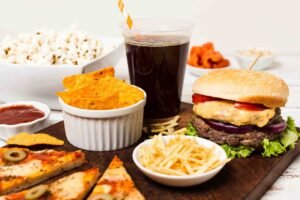
Unwashed Fruits and Vegetables
Unwashed fruits and vegetables can be contaminated with harmful bacteria and parasites, such as Toxoplasma. Toxoplasmosis can cause severe complications for the developing baby, including brain damage and blindness. Always wash fruits and vegetables thoroughly before consumption.
Pineapple
Pineapple contains bromelain, an enzyme that can soften the cervix and potentially induce labor when consumed in large quantities. While small amounts are unlikely to cause harm, it’s best to exercise caution and consult with a healthcare provider.
Processed and Junk Foods
Processed and junk foods are typically high in unhealthy fats, sugars, and sodium, which can contribute to excessive weight gain, gestational diabetes, and high blood pressure. These conditions can lead to complications such as preeclampsia and preterm birth.
Examples of Processed and Junk Foods
- Chips
- Cookies
- Candies
- Fast Food
- Sugary Beverages
Opting for nutrient-dense foods such as fruits, vegetables, whole grains, and lean proteins is a healthier choice for both mother and baby.
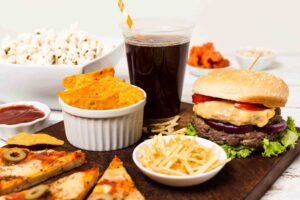
Artificial Sweeteners
While some artificial sweeteners are considered safe during pregnancy, others should be avoided due to potential health risks.
Sweeteners to Avoid
- Saccharin: Can cross the placenta and may remain in fetal tissues.
- Cyclamate: Banned in some countries due to cancer risk in animals.
- Aspartame: Should be avoided by women with phenylketonuria (PKU) as it contains phenylalanine, which can be harmful to the fetus.
Safer Alternatives
- Stevia: A natural sweetener that is generally considered safe during pregnancy.
- Sucralose: Also known as Splenda, it is widely regarded as safe for pregnant women.
- Herbal Teas and Supplements
- While herbal teas and supplements can offer health benefits, some may pose risks during pregnancy.
Teas to Avoid
- Chamomile: Can cause uterine contractions.
- Pennyroyal: Associated with miscarriage.
- Sassafras: Can cause liver damage and is considered carcinogenic.
Supplements to Avoid
- Vitamin A (in high doses): Can cause birth defects.
- Black Cohosh: Can induce uterine contractions.
- Dong Quai: Associated with miscarriage and preterm labor.
Consulting with a healthcare provider before consuming any herbal teas or supplements is crucial to ensure they are safe during pregnancy.
Conclusion
Navigating the dietary landscape during pregnancy can be challenging, but it is essential for the health and well-being of both the mother and the developing baby. Understanding which foods to avoid is a critical component of maintaining a healthy pregnancy. By steering clear of certain foods, pregnant women can minimize the risk of foodborne illnesses, developmental issues, and other potential complications. This comprehensive guide has highlighted various categories of foods that should be avoided, including raw and undercooked foods, high-mercury fish, unpasteurized dairy products, excessive caffeine, alcohol, certain fruits and vegetables, processed and junk foods, artificial sweeteners, and specific herbal teas and supplements.
Maintaining a healthy and safe diet during pregnancy involves making informed choices and being vigilant about potential risks. Consulting with healthcare professionals, including doctors and registered dietitians, can provide personalized guidance tailored to individual needs. By avoiding harmful foods and focusing on nutrient-rich options, pregnant women can create a nourishing environment for their developing babies. Embracing a healthy diet not only supports the mother’s health but also lays a strong foundation for the baby’s growth and development. Making conscious dietary choices, staying informed, and seeking professional advice when needed can help ensure a healthy, joyful, and successful pregnancy. Remember, every bite counts towards a healthier future for both mother and child.


